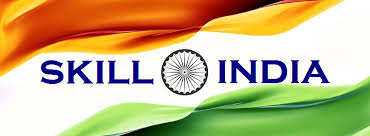After the successful launch of Digital India and Make in India initiatives by Narendra Modi during his one year of governance, the revised skill development policy or Skill India is also initiated by Narendra Modi. It is one of Narendra Modi’s dream projects with the main aim to create many job ready youth in the country.
Less than 5% of our potential work force gets formal skill training to be employable. The mission will work through the Skill Development and Entrepreneurship Ministry and aims to consolidate skill initiatives spread across several ministries. It will allow the government to standardise procedures and outcomes across 31 Sector Skill Councils. The new scheme is expected to move beyond the target of skilling 500 million youth by 2020 that was set by the UPA government. – As per the Economic survey 2014-15, India’s manufacturing was skill-intensive which was not in line with the country’s comparative advantage in the unskilled labour and recommended rebalancing of policies like Make in India and Skilling India.
This is what Vivek Nath, MD India, Towers Watson said in an interview :
“I would like to laud the government’s Budget 2015 for its increased emphasis on skill development and education of youth. Burdened by the pressure of an expanding labour market, the world’s youngest workforce is today faced with the challenge of ‘skilling’, with a vast majority not being ‘job ready’ or having any certified abilities. With the government’s impetus to boost growth and facilitate investment in high productivity sectors like infrastructure, manufacturing and related industries, promises to create a vast pool of job opportunities in the coming years.
The Prime Minister has set 13 goals for ‘Team India’ led by the states and guided by the Centre, to achieve by 2022 out of which 5 are to be achieved through the Skill India mission. They are:
- Access to livelihood: At least one member from each family should have access to employment or economic
- Reducing Poverty: All schemes centred at eliminating absolute poverty.
- Educating Skilling youth: Ensure senior secondary school within 5 km of each child, upgrade over 80,000 secondary schools, add 75,000 junior/middle, to the senior secondary level.
- World’s manufacturing hub: Ensure two-thirds of populations below 35 get jobs through Skill India initiative.
- Spirit of entrepreneurship: support start-ups to turn the youth from job seekers to job creators.
Main features of the initiative(as per Union Budget 2015-16):
- To consolidate skill initiatives spread across several ministries to be launched.
- Deen Dayal Upadhyay Gramin Kaushal Yojana to enhance the employability of rural youth. Around Rs1500 is allocated for this Yojana.
- A student Financial Aid authority to administer and monitor the front-end all scholarship as well as Educational Loan Schemes, throught he Pradhan Mantri Vidya Lakshmi Karyakram. Rs 1,350 crore are allocated for National Skill Certification and Monetary Reward Scheme (STAR Scheme) helping those who wish to acquire a skill but need financial support.
- Further Rs 150 crore are allocated under Kaushal Vikas Yojana will also provide essential fillip to the Skill Development initiatives in the country.
- An IIT to be set up in Karnataka and Indian School of Mines, Dhanbad to be upgraded into a fully fledged IIT.
- New All India Institute of Medical Sciences(AIIMs) to be set up in Jammu and Kashmir, Punjab, Himachal Pradesh and Assam.
- 3 new National Institute of Pharmaceuticals Education and Research in Maharashtra , Rajasthan and Chhattisgarh and one institute of Science and Education Research in Nagaland and Orissa.
- Government is committed to comply with all the legal commitments made to Andhra Pradesh and Telengana at the time of their reorganization.
- Part of Delhi-Mumbai Industrial Corridor (DMIC);Ahmedabad-Dhaulera Investment region and Shendra-Bidkin Industrial Park are now in a position to start work on basic infrastructure.
Government should also focus on educating the rural women and significant reservation should be done for the same as the rural women contribute significantly to Indian economic development.
There is a great need for jobs in India to shift from being ‘qualification based’ to ‘skill based’. Today, almost every hiring done in India uses education and qualification as a surrogate for skill. This is a huge roadblock that the Skill India initiative needs to address. While the future steps in ‘skilling’ are undertaken, it is equally important for jobs and hiring in India to orient itself, based on skills.
It will be important for the industry and Government to define jobs using skills as the focus. This will ensure that even educational institutions will focus on imparting skills that lead to employability, rather than doling out certificates and degrees.
Through successful implementation of the scheme, India which is already a world leader in human resource would be able to meet the skill deficit and would open new avenues of manufacturing and investment in the country. Thus this scheme would complement Narendra Modi’s already publicized ‘Make in India’ initiative and would lead to the overall economic development of the country.





15 Comments. Leave new
Great work.. very well drafted..:)
Great work.. 🙂
Thanks for the snapshot..Great job !
Nice article
True said! Indians have a great expectation on NaMo Government.. Indians are always hardworking and talented!! We should enhance the skills and devolop the talent.. Good work!!
Excellent work..!
Well codified:):)
Excellent work piece.
Beautifully written. Amazing!
great article.
Well researched
nice one 🙂
keep going 🙂
India is on its path to great developments
India is on its path to radical developments
nice work